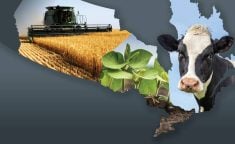Amid all the negative trade news something positive: last year Canada exported a record $59.3 billion of agri-food products.
That’s up three per cent from 2017, the Canadian Agri-Food Trade Alliance (CAFTA) says in its April newsletter.
“The gains are being fuelled by ever-increasing global demand for world-class Canadian products including in key markets such as the United States — a 3.5 per cent increase — and in China — a whopping 32 per cent increase,” the newsletter says.
The outlook, especially for exports to China, isn’t as promising in 2019, CAFTA president Brian Innes said in an interview May 16.
Read Also

AAFC organic research program cut
Canada’s organic sector says the loss of a federal organic research program at Swift Current, Sask., will set the industry back.
“2018 was different than how people are feeling now,” he said. “We’ve seen headwinds on a few commodities, and we’re also seeing in the grains and oilseeds sector overall the price outlook is not as strong as it has been in the last few years.
“But I think when producers look at this number and they see $3 billion more in exports from 2017 to 2018, and they reflect on the challenges we’re having now, we’re still exporting very significant amounts of food and the problems we are experiencing, while significant, don’t take away from our overall success as an agri-food exporter.”
Canadian canola and soybean seed exports to China were strong earlier in the crop year but canola exports stopped in late March and soybean shipments dropped to almost nothing since January.
China complained Canadian canola shipments were contaminated with pests — a charge Canada denies.
Two weeks ago Prime Minister Trudeau acknowledged China’s canola boycott was linked to the ongoing United States-China trade dispute.
China has rebuffed Canada’s request to a face-to-face meeting on the matter.
Although Canada hasn’t launched a formal complaint at the World Trade Organization (WTO), May 7 Canada’s WTO ambassador told the organization’s general council Canada wants to meet in China in good faith.
“Open and predictable rules-based international trade is the only way global commerce can succeed,” Canadian Press reported Stephen de Boer as saying. “Co-operation between WTO members — and willingness to engage on issues — is equally important.”
Meanwhile, Chinese soybean buyers say they are afraid to buy Canadian because their government might scuttle the transaction.
“In 2019 we’re hopeful that cooler heads prevail and we can resume more normal relations with China, but there’s no question our exports will be down in China in 2019 over 2018,” Innes said.
The U.S. and China were Canada’s No. 1 and 2 agri-food customers last year, making up 52 and 16 per cent of the total value, respectively.
Innes credits the quality and reliability of Canadian agri-food products for the record exports.
“We had good years across a number of different commodities,” he said. “We had strong grain production, which means strong grain exports. We had strong years for both beef and pork. When we have agriculture firing on all cylinders we continue to grow, we continue to have stronger exports… and bring more value from the world back to Canada.”
In the four months since the Comprehensive and Progressive Agreement for Trans-Pacific Partnership (CPTPP) came into force, exports to Japan alone and across the wider CPTPP region are up by 13.5 per cent and 12.7 per cent respectively, CAFTA said.
Agri-food products leading the charge include oilseed products, ($363 million), grain products ($318 million), wheat ($278 million), pork, ($263 million), beef ($66 million), pulses ($28 million) and sugar-containing products ($9.5 million).
















